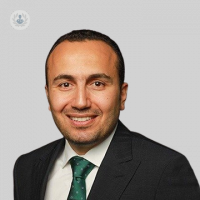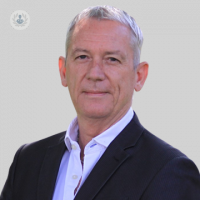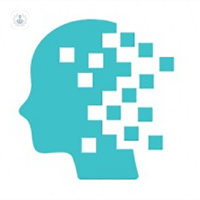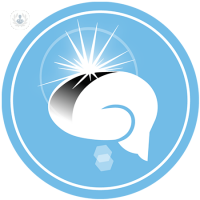What is transcranial magnetic stimulation (TMS)?
Transcranial magnetic stimulation (TMS) is a non-invasive procedure used to treat depression and other forms of mental illness, including post-traumatic stress disorder (PTSD). TMS uses magnetic fields to stimulate nerve cells in the brain. Often TMS is used when other treatment options have been exhausted and unsuccessful.

Why is transcranial magnetic stimulation performed?
TMS is performed on patients with depression that has not responded to other treatment options, such as medication or therapy.
What does transcranial magnetic stimulation involve?
During a session of TMS, an electromagnetic coil is placed next to the scalp close to the forehead. The device then sends magnetic pulses through the skull, stimulating nerve cells in the part of the brain linked to mood and depression. This is a painless procedure.
The science behind TMS is not completely understood, but the magnetic pulses have been shown to affect how parts of the brain work, helping to ease symptoms related to mood and depression. When you have TMS, you will normally have a series of treatments.
During treatment, you are sat in a chair with ear plugs. The procedure lasts approximately forty minutes, in which you will be fully awake.
How do you prepare for transcranial magnetic stimulation?
Transcranial magnetic stimulation will only be used following a physical examination and a psychiatric evaluation.
There are a few special circumstances where TMS might not be appropriate:
- You are pregnant or planning to become pregnant
- You take medication
- You have a history of seizures or epilepsy
- You have metal implanted devices (such as stents, hearing aids)
- You have other mental health problems
Aftercare following transcranial magnetic stimulation
Following a session of TMS, you can return to your normal activities immediately.
If TMS is successful, you might notice the symptoms of depression are eased, but this can take a few weeks of treatment.
Are there alternative treatments to transcranial magnetic stimulation?
As TMS is a fairly experimental treatment option, medications and therapy will be used first to help improve and ease symptoms of mental illness.
03-03-2015 11-02-2023Transcranial magnetic stimulation (TMS)
Dr Leon Rozewicz - Psychiatry
Created on: 03-03-2015
Updated on: 11-02-2023
Edited by: Sophie Kennedy
What is transcranial magnetic stimulation (TMS)?
Transcranial magnetic stimulation (TMS) is a non-invasive procedure used to treat depression and other forms of mental illness, including post-traumatic stress disorder (PTSD). TMS uses magnetic fields to stimulate nerve cells in the brain. Often TMS is used when other treatment options have been exhausted and unsuccessful.

Why is transcranial magnetic stimulation performed?
TMS is performed on patients with depression that has not responded to other treatment options, such as medication or therapy.
What does transcranial magnetic stimulation involve?
During a session of TMS, an electromagnetic coil is placed next to the scalp close to the forehead. The device then sends magnetic pulses through the skull, stimulating nerve cells in the part of the brain linked to mood and depression. This is a painless procedure.
The science behind TMS is not completely understood, but the magnetic pulses have been shown to affect how parts of the brain work, helping to ease symptoms related to mood and depression. When you have TMS, you will normally have a series of treatments.
During treatment, you are sat in a chair with ear plugs. The procedure lasts approximately forty minutes, in which you will be fully awake.
How do you prepare for transcranial magnetic stimulation?
Transcranial magnetic stimulation will only be used following a physical examination and a psychiatric evaluation.
There are a few special circumstances where TMS might not be appropriate:
- You are pregnant or planning to become pregnant
- You take medication
- You have a history of seizures or epilepsy
- You have metal implanted devices (such as stents, hearing aids)
- You have other mental health problems
Aftercare following transcranial magnetic stimulation
Following a session of TMS, you can return to your normal activities immediately.
If TMS is successful, you might notice the symptoms of depression are eased, but this can take a few weeks of treatment.
Are there alternative treatments to transcranial magnetic stimulation?
As TMS is a fairly experimental treatment option, medications and therapy will be used first to help improve and ease symptoms of mental illness.


Understanding adult ADHD Symptoms
By Dr Justin Stephenson
2024-12-15
If you find yourself wondering whether your struggles with focus, attention, and impulsivity may indicate adult ADHD, you may want to look into it further. Leading clinical psychologist Dr Justin Stephenson discusses adult ADHD symptoms in this article, helping you develop a better understanding of this often-misunderstood condition. See more


TMS treatment for anxiety: What is it, and how is it used?
By Dr Mohamed Abdelghani
2024-12-14
Transcranial magnetic stimulation (TMS) is a non-invasive procedure that uses magnetic fields to stimulate nerve cells in the brain. It’s been increasingly recognised as a potential treatment for various mental health conditions, including anxiety disorders. In this article, highly respected consultant psychiatrist Dr Mohamed Abdelgani takes an in-depth look at the use of TMS in the treatment of anxiety and addresses some common questions patients may have about this therapy. See more


An expert guide to TMS for the treatment of depression in adolescents
By Dr Justin Stephenson
2024-12-14
TMS (transcranial magnetic stimulation) offers an alternative approach to treating mental health conditions, such as depression, in adolescents. Here, Dr Justin Stephenson, renowned clinical psychologist at Smart TMS London, provides a comprehensive insight into TMS for the treatment of depression in adolescents. See more


Young people and depression: Exploring transcranial magnetic stimulation (TMS)
By Dr Justin Stephenson
2024-12-14
For young people dealing with depression, transcranial magnetic stimulation (TMS) is a treatment approach well worth exploring. To shed light on how TMS can be beneficial for adolescents aged 14 to 17 struggling with depression, we spoke with respected clinical psychologist Dr Justin Stephenson. See more
Experts in Transcranial magnetic stimulation (TMS)
-
Dr Mohamed Abdelghani
PsychiatryExpert in:
- Transcranial magnetic stimulation (TMS)
- Adult ADHD
- Bipolar disorder
- Obsessive compulsive disorder (OCD)
- Depression
- Anxiety
-
Dr Leon Rozewicz
PsychiatryExpert in:
- Adult ADHD
- Depression
- Bipolar disorder
- Transcranial magnetic stimulation (TMS)
- Post-traumatic stress disorder (PTSD)
- Anxiety
-
Professor Alex O'Neill-Kerr
PsychiatryExpert in:
- Transcranial magnetic stimulation (TMS)
- Depression
- Obsessive compulsive disorder (OCD)
- Addiction
- Anxiety
- Bipolar disorder
-
Dr Justin Stephenson
PsychologyExpert in:
- Transcranial magnetic stimulation (TMS)
- Depression
- ADHD
- Clinical psychology
- Post-traumatic stress disorder (PTSD)
-
- See all

Smart TMS Norwich
Smart TMS Norwich
The Grange, 62 Spixworth Rd, Norwich
No existe teléfono en el centro.
By using the telephone number provided by TOP DOCTORS, you automatically agree to let us use your phone number for statistical and commercial purposes. For further information, read our Privacy Policy
Top Doctors

Atrom Mindcare Holistic Psychiatric Clinic
Atrom Mindcare Holistic Psychiatric Clinic
The Civic Building, 323 High Street Regus, 323 High St, Epping
No existe teléfono en el centro.
By using the telephone number provided by TOP DOCTORS, you automatically agree to let us use your phone number for statistical and commercial purposes. For further information, read our Privacy Policy
Top Doctors

Transforming Mind Solutions
Transforming Mind Solutions
Rothersthorpe House, 4 Billing Rd, Northampton
No existe teléfono en el centro.
By using the telephone number provided by TOP DOCTORS, you automatically agree to let us use your phone number for statistical and commercial purposes. For further information, read our Privacy Policy
Top Doctors
-
Smart TMS Norwich
The Grange, 62 Spixworth Rd, Norwich , NorwichExpert in:
- Addictions
- Anxiety
- Depression
- Transcranial magnetic stimulation (TMS)
- Bipolar disorder
- Obsessive compulsive disorder (OCD)
-
Atrom Mindcare Holistic Psychiatric Clinic
The Civic Building, 323 High Street Regus, 323 High St, Epping, EppingExpert in:
- Anxiety
- Autism
- Depression
- Transcranial magnetic stimulation (TMS)
- Psychology
- Psychosis
-
Transforming Mind Solutions
Rothersthorpe House, 4 Billing Rd, Northampton, NorthamptonExpert in:
- Addictions
- Anxiety
- Psychiatry
- Post-traumatic stress disorder (PTSD)
- Obsessive compulsive disorder (OCD)
- Most viewed diseases, medical tests, and treatments
- Ulnar nerve entrapment
- Electrophysiology study
- Peripheral nerve block
- Peripheral neuropathy
- Neuro-ophthalmology
- Migraine
- Maternal mental health
- Lumbar herniated disc
- Spinal surgery
- Minimal access surgery (keyhole surgery)







